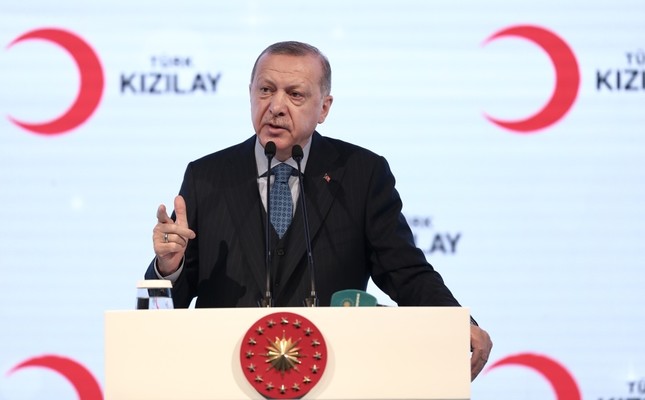PresIdent Recep Tayyip Erdoğan said Monday that Turkey’s main aim in Syria is establishing a safe zone in the country’s northern region that will enable 4 million refugees to return to their hometowns. Speaking at a meeting of the Red Crescent, Erdoğan reminded that until now they have secured the return of almost 300,000 Syrian refugees to liberated areas of northern Syria, including Azaz, Jarablus, al-Bab and Afrin.
“I believe a safe zone formed all along the southern Syrian border of Turkey will enable these numbers to reach millions,” the president said.
In the past three years Turkey has successfully conducted two cross-border Turkish operations into Syria – Operation Euphrates Shield launched in August 2016 and Operation Olive Branch launched in January 2018, which were both meant to eradicate the presence of terrorist elements near Turkey’s borders.
Following the two operations in northern Syria, Turkey has been involved in efforts to rebuild the towns’ infrastructures as well as health and educational institutions.
Schools are being renovated and a hospital is being built in the region. Turkey is also helping local people build olive oil facilities in the town where agriculture is the main source of income for its residents. Thanks to the success of both operations and the post-operation developments in the liberated areas, the numbers of refugees returning to their hometowns have increased in recent months.
Last month, Interior Minister Süleyman Soylu said nearly 300,000 Syrians returned to their homes after the Turkish military’s operations.
The idea of the safe zone, although mentioned several times by Erdoğan over the years, surfaced once again during his phone call with U.S. President Donald Trump.
In the talk, the two leaders discussed establishing a terror-free safe zone in Syria’s north based on the country’s territorial integrity.
Last week, Erdoğan announced that Turkey would establish a safe zone along the length of its Syrian border with the assistance of U.S.-led coalition forces. The president also mentioned the issue during his recent visit to Russia.
On Wednesday, following his meeting with Russian President Vladimir Putin in Moscow, Erdoğan said Turkey and Russia are on the same page regarding the planned “safe zone” in northern Syria. Speaking on the matter during a joint press conference following this meeting, Erdoğan said: “The U.S. has already indicated a positive stance. Neither do we have problems [concerning the safe zone] with Russia.”
Erdoğan has been suggesting since 2012 that a safe zone of 30-40 kilometers could be established between the northern Syrian towns of Jarablus and al-Rai. However, the plan did not come to fruition at the time.
Operation east of Euphrates to eradicate Daesh remnants
Mentioning the operation east of the Euphrates that is expected to be launched soon, Erdoğan said yesterday that it will be the third operation of the Turkish military in the region to clear out remnants of Daesh terrorists.
“We will bring peace to the east of the Euphrates soon as we did in other areas,” Erdoğan said.
Turkey is also prepared to launch an operation east of the Euphrates to eliminate the terrorist elements. However, following the U.S.’ decision to withdraw from Syria, Ankara decided to put the operation on hold for some time.
The president said with this purpose of clearing east of the Euphrates from the terrorists, Turkey continues to have talks with the main actors in the region, particularly Russia and the U.S.
“We have had very successful meetings with both sides. While we are continuing our diplomatic negotiations, we have also completed our preparations for the next step [Operation Euphrates Shield],” he said.
“Turkey is not only for the eradication of the terrorist organization but is also making great efforts to mitigate the effects of the humanitarian crisis caused by the conflict in Syria,” the president added.
He also mentioned the brutal terror attacks of Daesh in both Syria and Turkey, adding that the terrorist organization also fought with moderate opposition groups with heavy weapons obtained by the Bashar Assad regime.
“Turkey will destroy the remaining Daesh elements in Syria, which were specifically trained to target the country,” he further underlined.
Criticizing the Western countries for their stance against Daesh, Erdoğan said the West’s struggle against Daesh is based on arming another terrorist organization, referring to the PKK’s Syrian affiliate People’s Protection Units (YPG) and the U.S.’ support of it. He said the U.S. has sent thousands of weapons to the YPG, a terrorist organization that recruits children, and destroys mosques and schools in areas that it invades, only due to the claims that it fights Daesh.
The YPG has organic organizational and operational links with the PKK, a group considered a terrorist organization by the U.S., the EU and Turkey. The U.S. has provided military training and given truckloads of military support to the YPG, despite its NATO ally’s security concerns.
The details of the safe zone need to be ironed out; yet, one thing is clear: Turkey is firmly against the presence of the YPG in the region. A region free of terrorists along its border would reduce Ankara’s concerns to an extent. Ankara has been pointing out that it will not allow the YPG to strengthen its grip in Syria. While establishing a safe zone would eliminate some of Turkey’s concerns, the presence of the YPG in Syria and its plan to form a quasi-state will continue to present a threat to the country.

